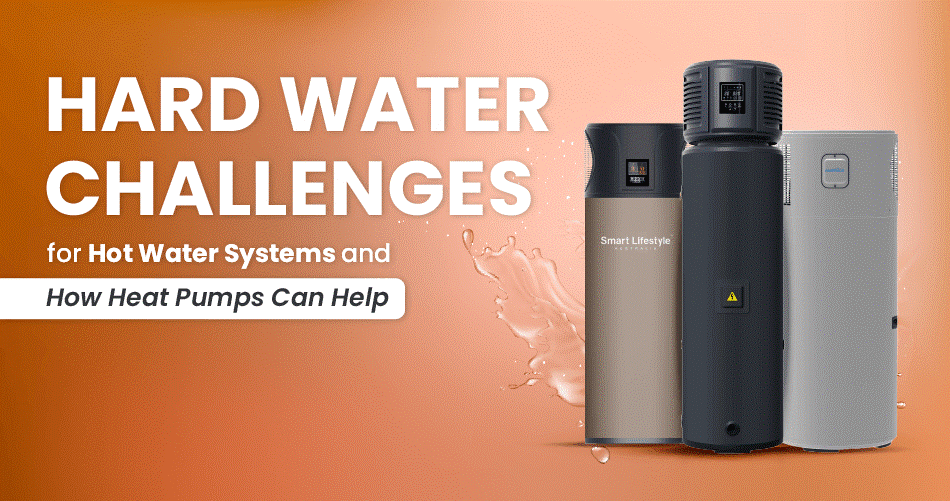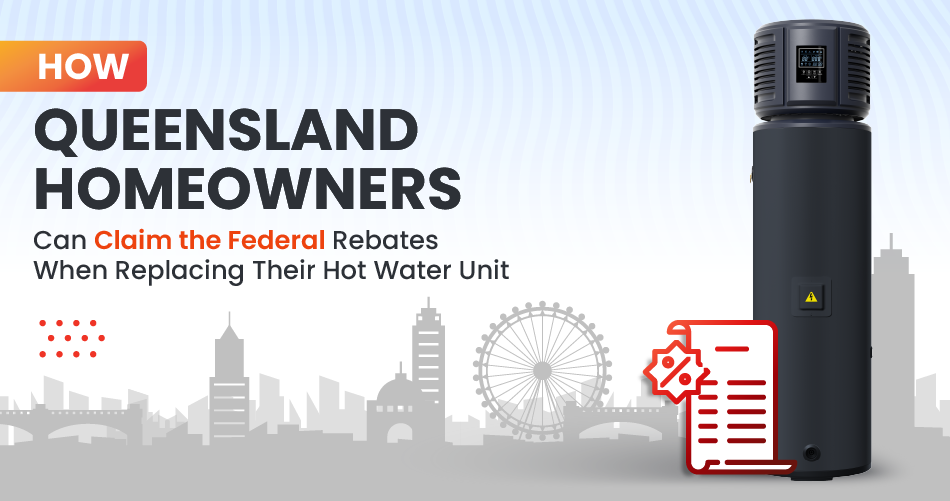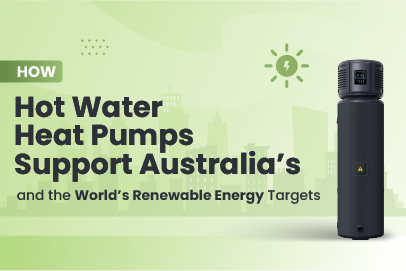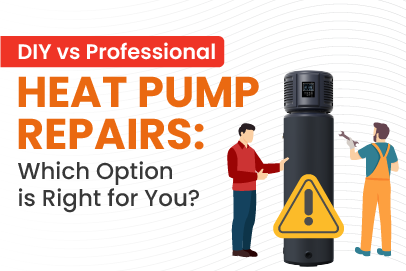Hard water is a common issue in many households, particularly in regions where the water supply has a high concentration of minerals like calcium and magnesium.
Over time, the buildup of mineral deposits in these systems can lead to inefficiency, increased energy consumption, and costly repairs.
Understanding Hard Water
What is Hard Water?
Hard water is water that contains a high level of dissolved minerals, primarily calcium and magnesium.
These minerals enter the water supply as it passes through soil and rock formations rich in limestone, chalk, or gypsum. The degree of water hardness varies by region, depending on the geological makeup of the area.
Causes of Hard Water
The presence of calcium and magnesium ions in water is the primary cause of hard water.
When these minerals dissolve in water, they react with heat and create scale, which can accumulate on various surfaces, including pipes, faucets, and water heaters. The higher the concentration of these minerals, the "harder" the water is considered.
Common Problems Associated with Hard Water
- Reduced Water Heater Efficiency: One of the most significant hard water problems is the formation of scale on the heating elements of water heaters. This scale acts as an insulating layer, preventing the efficient transfer of heat to the water, leading to longer heating times and higher energy consumption.
- Increased Energy Consumption: As the efficiency of the water heater decreases, it takes more energy to heat the same amount of water. This not only leads to higher energy bills but also puts additional strain on the water heater, reducing its lifespan.
- Equipment Damage: Over time, the buildup of scale can cause significant damage to water heaters, leading to costly repairs or even the need for a complete replacement.
The Impact of Hard Water on Hot Water Systems
How Hard Water Affects Water Heaters
Hard water can have a detrimental effect on hot water systems. The minerals in hard water precipitate out when heated, forming a hard, crusty layer of scale on the heating elements and the interior surfaces of the water heater.
This scale buildup reduces the efficiency of the water heater by acting as a barrier to heat transfer, causing the unit to work harder to achieve the desired water temperature.
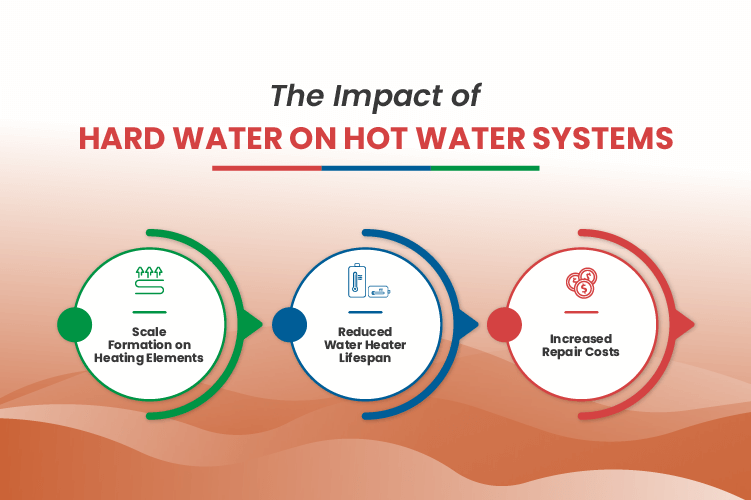
Scale Formation on Heating Elements
The most visible impact of hard water on hot water systems is scale formation on the heating elements.
Over time, this scale can accumulate to the point where it completely covers the heating elements, rendering them ineffective. In severe cases, the scale can even cause the heating elements to overheat and fail.
Reduced Water Heater Lifespan
The strain caused by hard water can significantly reduce the lifespan of a hot water system. As the system works harder to heat the water, it experiences more wear and tear, leading to a higher likelihood of breakdowns and the need for repairs.
Increased Repair Costs
The issues caused by hard water often result in more frequent repairs. Whether it's replacing heating elements or flushing the system to remove scale, these repairs can add up quickly, making hard water a costly problem for homeowners.
Additional Problems Caused by Hard Water
Beyond the hot water system itself, hard water can also cause prob water heater problems throughout the home.
For example, the scale buildup can clog pipes and reduce water flow, leading to plumbing issues. Appliances that use hot water, such as dishwashers and washing machines, may also suffer from decreased efficiency and a shorter lifespan due to hard water.
Heat Pumps as a Solution
How Heat Pumps Work
Heat pump water heaters operate differently from traditional water heaters. Instead of generating heat directly, they use electricity to move heat from the air into the water.
This process is much more energy-efficient and has several advantages, particularly for homes dealing with hard water challenges.
Benefits of Heat Pump Water Heaters
One of the key benefits of heat pump water heaters is their energy efficiency. Because they move heat rather than generate it, they can be two to three times more energy-efficient than traditional water heaters.
This efficiency translates to lower energy bills and a reduced carbon footprint, making heat pumps an environmentally friendly choice.
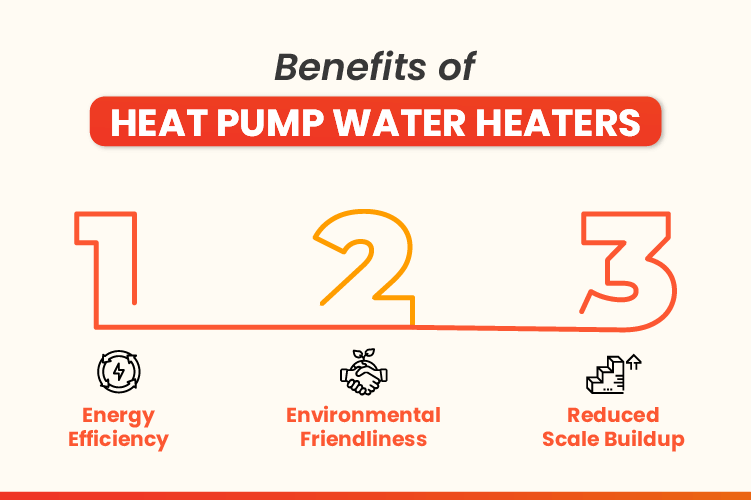
- Energy Efficiency: Heat pumps are designed to operate efficiently even in the presence of hard water. The reduced reliance on heating elements means there is less opportunity for scale buildup, which in turn means less maintenance and a longer lifespan for the system.
- Environmental Friendliness: By using less energy, heat pump water heaters contribute to a reduction in greenhouse gas emissions. This makes them an excellent choice for homeowners looking to reduce their environmental impact.
- Reduced Scale Buildup: Unlike traditional water heaters, which rely on direct heating elements that are prone to scale buildup, heat pumps use a different method that minimizes the formation of scale, leading to fewer water heater problems and reduced maintenance costs.
Comparing Heat Pumps to Traditional Water Heaters
When comparing heat pumps to traditional water heaters, it's clear that heat pumps offer several advantages, particularly in areas with hard water.
While the initial investment in a heat pump may be higher, the long-term savings in energy costs and reduced maintenance make them a worthwhile investment.
Additionally, many regions offer heat pump hot water rebate and incentives for installing heat pumps, further reducing the cost of switching.
Overcoming Challenges with Heat Pump Water Heaters
Despite the many advantages, there are some hard water challenges associated with heat pump water heaters.
For example, they require a certain amount of space and are most effective in climates where the temperature does not drop too low. However, by choosing the right system and ensuring regular maintenance, these challenges can be easily managed.
Choosing the Right Heat Pump
Factors to Consider When Selecting a Heat Pump
When choosing a heat pump, several factors should be considered to ensure you select the right system for your home.
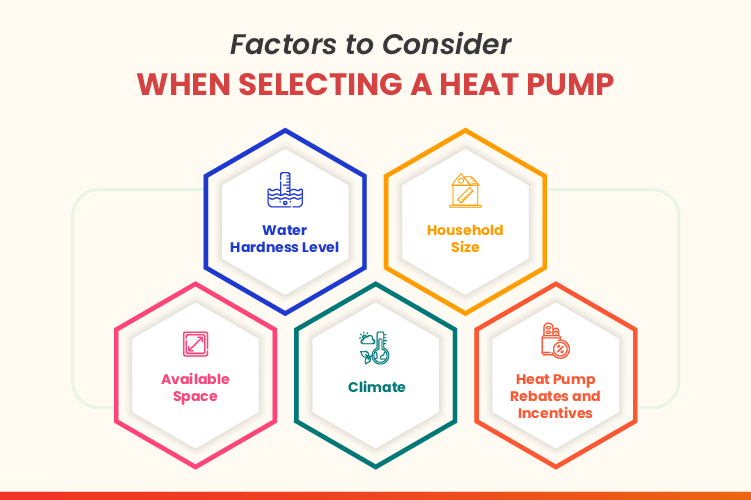
- Water Hardness Level: If your home has hard water, you'll want to choose a heat pump system that is designed to handle the specific challenges posed by hard water.
- Household Size: The size of your household will determine the capacity of the heat pump you need. Larger households will require a system with a higher capacity to ensure there is always enough hot water.
- Climate: The effectiveness of heat pumps can vary depending on the climate. In colder climates, you may need to invest in a system designed to operate efficiently in low temperatures.
- Available Space: Heat pump systems typically require more space than traditional water heaters, so it's important to ensure you have enough room for the system you choose.
- Heat Pump Rebates and Incentives: Many regions offer rebates and incentives for installing heat pumps, which can help offset the initial cost of the system.
Maintaining Your Heat Pump
Importance of Regular Maintenance
Regular maintenance is essential to ensure your heat pump water heater operates efficiently and lasts as long as possible.
Without proper maintenance, even the best system can suffer from reduced efficiency and a shorter lifespan.
Basic Maintenance Tips
Some basic heat pump maintenance tasks can help keep your heat pump water heater in good condition.
These include regularly checking the system for leaks, ensuring proper airflow, and flushing the system to remove any scale buildup.

Conclusion
Hard water presents significant challenges for hot water systems, leading to decreased efficiency, increased energy consumption, and costly repairs.
However, heat pump water heaters offer a viable hard water solutions to these problems. With their energy efficiency, reduced scale buildup, and environmental benefits, heat pumps are an excellent choice for homeowners dealing with hard water issues.
By carefully selecting the right system and ensuring regular maintenance, you can enjoy reliable hot water and long-term savings. For those considering an upgrade, exploring heat pump water heaters could be a wise investment for the future.

